International Polity - Current Affairs for December, 2017
International Polity Current Affairs for December, 2017
Month wise coverage of International Polity Current Affairs helps you improve your general knowledge and prepare for all competitive exams like IBPS, Bank PO, SBI PO, RRB, RBI, LIC, Specialist Officer, Clerk, SSC, UPSC, Railway etc. This section is updated daily with the most important events.Preparing International Polity Current Affairs December, 2017
1. Read the most important International Polity Current affairs and facts here. 2. Take practice test of our International Polity MCQ and Objective type questions. 3. Clear any quiz, GK, job interview or competitive exam on current affairs.
- Month & Year
▼ 2+2 dialogue between India and Australia held [12-14-17]
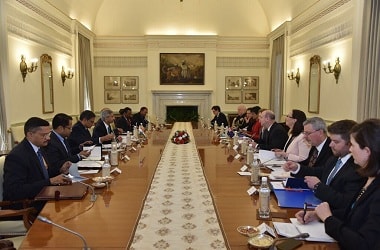 India and Australia held their first '2+2 dialogue' in New Delhi and highlighted need to maintain Asia-Pacific region as a "free" and "open" zone.
The 2+2 dialogue model between both countries included foreign and defence secretaries.
India and Australia share warm bilateral relations based on shared democratic values and pluralism.
There is a growing convergence of strategic perspectives between the two countries.
2+2 Dialogue: Know More India and Australia held their first '2+2 dialogue' in New Delhi and highlighted need to maintain Asia-Pacific region as a "free" and "open" zone.
The 2+2 dialogue model between both countries included foreign and defence secretaries.
India and Australia share warm bilateral relations based on shared democratic values and pluralism.
There is a growing convergence of strategic perspectives between the two countries.
2+2 Dialogue: Know More
- It was first meeting of this level since the two sides participated in quadrilateral discussion between India, United States, Australia and Japan in Manila in November 2017 for new strategic partnership targeting the Asia-Pacific region.
- In the 2+2 dialogue, all aspects of bilateral relations with focus on strategic and defence relations between two countries were reviewed.
- Both countries agreed that free, open, prosperous and inclusive Indo-Pacific region serves the long-term interests of all countries in the region and of the world at large.
- The dialogue indicated that focus remains on freedom of navigation in South China Sea, where China has been reclaiming land for infrastructure, boosting its maritime influence.
|
▼ EU Withdrawal Bill: May loses Brexit vote [12-14-17]
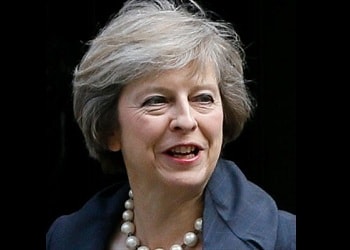 British Prime Minister Theresa May on December 13 suffered a damaging parliamentary defeat over Brexit, after her own MPs rebelled to demand parliament have the final say on the divorce deal with Brussels.
Members of Ms. May's Conservative party joined with opposition lawmakers to inflict the government's first defeat over the flagship E.U. (Withdrawal) Bill, sparking huge cheers in the House of Commons.
It is a blow to Ms. May on the eve of a crucial summit in Brussels, where E.U. leaders are expected to approve the terms of the interim Brexit deal agreed last week after months of tortuous negotiations.
The E.U. (Withdrawal) Bill is intended to formally end Britain's membership of the E.U., as well as smooth its exit by transferring thousands of pieces of European legislation onto the U.K. statute books.
It also gives Ministers powers to amend the laws as they move across, to address any technical glitches.
But MPs objected to the fact that these so-called "Henry VIII" powers also extend to the implementation of the withdrawal agreement with the E.U. British Prime Minister Theresa May on December 13 suffered a damaging parliamentary defeat over Brexit, after her own MPs rebelled to demand parliament have the final say on the divorce deal with Brussels.
Members of Ms. May's Conservative party joined with opposition lawmakers to inflict the government's first defeat over the flagship E.U. (Withdrawal) Bill, sparking huge cheers in the House of Commons.
It is a blow to Ms. May on the eve of a crucial summit in Brussels, where E.U. leaders are expected to approve the terms of the interim Brexit deal agreed last week after months of tortuous negotiations.
The E.U. (Withdrawal) Bill is intended to formally end Britain's membership of the E.U., as well as smooth its exit by transferring thousands of pieces of European legislation onto the U.K. statute books.
It also gives Ministers powers to amend the laws as they move across, to address any technical glitches.
But MPs objected to the fact that these so-called "Henry VIII" powers also extend to the implementation of the withdrawal agreement with the E.U.
|
▼ Wassenaar Arrangement: India joins global grouping [12-11-17]
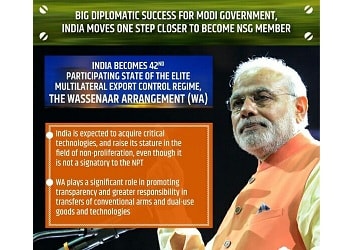 After its entry into the Missile Technology Control Regime in June 2016, India was on Thursday admitted as the 42nd member+ of the Wassenaar Arrangement - a global grouping that regulates transfer and access to conventional weapons and dual-use technologies.
In the coming months, India expects to be included in the Australia Group as well, leaving the Nuclear Suppliers Group (NSG) - where it faces stiff opposition from China - as the last non-proliferation regime that India expects to enter.
India still has to apply for licences for high-tech and dual-use exports, but from now, that process is expected to get easier.
This is the second of four non-proliferation regimes India has joined after the India-US nuclear deal was cleared.
The important aspect of three out of the four regimes is that China is not a member of them except for the NSG.
The formal application to Wassenaar was made by India in 2016, although the work to align Indian rules and munitions lists to Wassenaar rules began in 2014.
Bit by bit, India's accession to these non-proliferation regimes is making it clearer that China's political opposition is the stumbling block.
India's membership to MTCR opened doors for its space programme and its ability to source high-end missile systems and technologies as well as surveillance drones.
The Wassenaar membership is important for India, giving it a leg up as a responsible player in the world of dual-use goods and technologies and transfer of conventional arms.
It gives India an important voice in shaping global response to regional and global "security developments, advances in technology and market trend.
Outside these groups India would have trouble accessing a number of these technologies, because India has been for over 40 years the target of dual-use technology denial regimes.
Even after the India-US deal, India hasn't actually been able to break through these regimes.
In the coming months, India expects to be included in the Australia Group as well, leaving the Nuclear Suppliers Group (NSG) - where it faces stiff opposition from China - as the last non-proliferation regime that India expects to enter.
The WA membership is also expected to build up a strong case for India's entry into the 48-member Nuclear Suppliers Group (NSG). Significantly, China, which stonewalled India's entry into the 48-nation NSG, is not a member of the Wassenaar Arrangement.
What is Wassenaar Arrangement? After its entry into the Missile Technology Control Regime in June 2016, India was on Thursday admitted as the 42nd member+ of the Wassenaar Arrangement - a global grouping that regulates transfer and access to conventional weapons and dual-use technologies.
In the coming months, India expects to be included in the Australia Group as well, leaving the Nuclear Suppliers Group (NSG) - where it faces stiff opposition from China - as the last non-proliferation regime that India expects to enter.
India still has to apply for licences for high-tech and dual-use exports, but from now, that process is expected to get easier.
This is the second of four non-proliferation regimes India has joined after the India-US nuclear deal was cleared.
The important aspect of three out of the four regimes is that China is not a member of them except for the NSG.
The formal application to Wassenaar was made by India in 2016, although the work to align Indian rules and munitions lists to Wassenaar rules began in 2014.
Bit by bit, India's accession to these non-proliferation regimes is making it clearer that China's political opposition is the stumbling block.
India's membership to MTCR opened doors for its space programme and its ability to source high-end missile systems and technologies as well as surveillance drones.
The Wassenaar membership is important for India, giving it a leg up as a responsible player in the world of dual-use goods and technologies and transfer of conventional arms.
It gives India an important voice in shaping global response to regional and global "security developments, advances in technology and market trend.
Outside these groups India would have trouble accessing a number of these technologies, because India has been for over 40 years the target of dual-use technology denial regimes.
Even after the India-US deal, India hasn't actually been able to break through these regimes.
In the coming months, India expects to be included in the Australia Group as well, leaving the Nuclear Suppliers Group (NSG) - where it faces stiff opposition from China - as the last non-proliferation regime that India expects to enter.
The WA membership is also expected to build up a strong case for India's entry into the 48-member Nuclear Suppliers Group (NSG). Significantly, China, which stonewalled India's entry into the 48-nation NSG, is not a member of the Wassenaar Arrangement.
What is Wassenaar Arrangement?
- The Wassenaar Arrangement is an elite club of countries which subscribe to arms export controls, similar to the Nuclear Suppliers Group and the Missile Technology Control Regime.
- The body came into being in 1996 to succeed the Cold War-era Coordinating Committee for Multilateral Export Controls. The name comes from Wassenaar, a suburb of The Hague, where the agreement to start such a multi-lateral cooperation was reached in 1995.
- The WA has 42 members, the latest entrant being India. With the exception of China, all the other permanent members of the U.N. Security Council are signatories of the WA, which is headquartered in Vienna.
- According to the WA website, the goal of the Arrangement is to "promote transparency and greater responsibility in transfers of conventional arms and dual-use goods and technologies".
- Participants are required to "ensure that transfers of these items do not contribute to the development or enhancement of military capabilities which undermine the goal". The aim, according to WA, is also to prevent the acquisition of these items by terrorists.
- The Arrangement works according to what it calls WA Control Lists. The controls are subject to ratification by the participants.
- WA members agree to exchange information on sensitive dual-use goods and technologies and report on such transfers and denials of controlled items to non-participants.
|
▼ US President Trump recognises Jerusalem as Israeli capital [12-7-17]
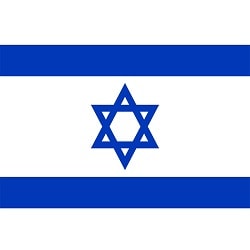 U.S. President Donald Trump reversed decades of policy on Dec 6, 2017 and recognised Jerusalem as the capital of Israel, despite warnings from around the world that the gesture will further drive a wedge between Israel and the Palestinians.
In a speech at the White House, Mr. Trump said his administration would also begin a process of moving the U.S. embassy in Tel Aviv to Jerusalem, which is expected to take years.
Trump aides contend the move reflects the reality of Jerusalem as the centre of Jewish faith and the fact that the city is the seat of the Israeli government.
Mr. Trump also called his decision "a long overdue" step to advance the peace process.
According to him, decision marked the start of a "new approach" to solving the thorny conflict between Israel and the Palestinians.
A Palestinian envoy said the decision was a declaration of war in the region.
Israel Vs Palestine Settlement: Know More U.S. President Donald Trump reversed decades of policy on Dec 6, 2017 and recognised Jerusalem as the capital of Israel, despite warnings from around the world that the gesture will further drive a wedge between Israel and the Palestinians.
In a speech at the White House, Mr. Trump said his administration would also begin a process of moving the U.S. embassy in Tel Aviv to Jerusalem, which is expected to take years.
Trump aides contend the move reflects the reality of Jerusalem as the centre of Jewish faith and the fact that the city is the seat of the Israeli government.
Mr. Trump also called his decision "a long overdue" step to advance the peace process.
According to him, decision marked the start of a "new approach" to solving the thorny conflict between Israel and the Palestinians.
A Palestinian envoy said the decision was a declaration of war in the region.
Israel Vs Palestine Settlement: Know More
- Senior administration officials said on Dec 4, 2017 evening that the formal recognition of Jerusalem as Israel's capital did not prejudice a possible settlement between the two parties on its status later.
- The construction of a new embassy in Jerusalem would be a matter of years, not months, an official said.
- They said the location of the U.S. embassy had no bearing on the peace process.
- Mr. Trump's predecessors - from Bill Clinton to George Bush - made similar promises on the campaign trail, but quickly reneged upon taking office.
|
▼ US pulls out of UN migration body [12-6-17]
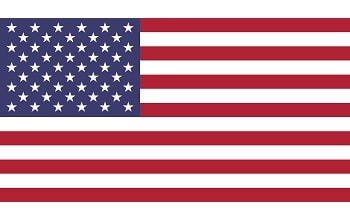 The United States has pulled out of UN Global Compact on Migration.
It has argued that Obama-era negotiated UN compact process deal contains numerous provisions that inconsistent with country's immigration and refugee policies and Trump Administration's immigration principles.
US under Trump administration has pulled out of several global commitments including UNESCO, UN cultural and educational body and 2015 Paris climate change agreement.
US participation in Global Compact on Migration process was started in 2016 following Obama Administration's decision to join UN's New York Declaration on Migration.
US under Trump administration has held that New York Declaration contains numerous provisions that are inconsistent with US immigration and refugee policies and Trump Administration's immigration principles.
Moreover, the global approach in New York Declaration is simply not compatible with US sovereignty.
UN Global Compact on Migration: Know More The United States has pulled out of UN Global Compact on Migration.
It has argued that Obama-era negotiated UN compact process deal contains numerous provisions that inconsistent with country's immigration and refugee policies and Trump Administration's immigration principles.
US under Trump administration has pulled out of several global commitments including UNESCO, UN cultural and educational body and 2015 Paris climate change agreement.
US participation in Global Compact on Migration process was started in 2016 following Obama Administration's decision to join UN's New York Declaration on Migration.
US under Trump administration has held that New York Declaration contains numerous provisions that are inconsistent with US immigration and refugee policies and Trump Administration's immigration principles.
Moreover, the global approach in New York Declaration is simply not compatible with US sovereignty.
UN Global Compact on Migration: Know More
- UN Global Compact on Migration will be the first intergovernmentally negotiated agreement under auspices of UN to cover all dimensions of international migration in holistic and comprehensive manner.
- Its genesis can be found in New York Declaration for Refugees and Migrants adopted in September 2016 by UN General Assembly.
- Under this declaration, signatory UN member countries had decided to develop global compact for safe, orderly and regular migration.
- The process to develop this global compact for migration was started in April 2017. It was to reach international consensus at the UN in 2018.
- The purpose of Global compact of migration is to provide significant opportunity to improve governance on migration, address challenges associated with today's migration, and strengthen contribution of migrants and migration to sustainable development.
|
▼ South Korea-US launch largest aerial drills [12-5-17]
 South Korea and United States have launched Vigilant Ace 18, their largest-ever joint aerial drills.
The exercise comes after North Korea tested Hwasong-15, its most advanced and powerful Inter Continental Ballistic Missile (ICBM) as part of its weapons programme.
Monday's Vigilant Ace exercis'es, due to last five days, will involve more than 230 warplanes and 12,000 soldiers from both sides.
The drill lasts from today until December 8 over eight air bases across the Korean Peninsula.
Trump's troops will be using the hi-tech F-35 Lightning IIs and F-22 Raptors.
Both fighter jets are said to be stronger than North Korea's arsenal.
F-35s can fly at speeds of 1,931km/h and are capable of carrying nuclear bombs and bunker busters.
Meanwhile, the F-22 can hit speeds of up to 2414km/h and are armed with Vulcan miniguns and Sidewinder missiles. South Korea and United States have launched Vigilant Ace 18, their largest-ever joint aerial drills.
The exercise comes after North Korea tested Hwasong-15, its most advanced and powerful Inter Continental Ballistic Missile (ICBM) as part of its weapons programme.
Monday's Vigilant Ace exercis'es, due to last five days, will involve more than 230 warplanes and 12,000 soldiers from both sides.
The drill lasts from today until December 8 over eight air bases across the Korean Peninsula.
Trump's troops will be using the hi-tech F-35 Lightning IIs and F-22 Raptors.
Both fighter jets are said to be stronger than North Korea's arsenal.
F-35s can fly at speeds of 1,931km/h and are capable of carrying nuclear bombs and bunker busters.
Meanwhile, the F-22 can hit speeds of up to 2414km/h and are armed with Vulcan miniguns and Sidewinder missiles.
|